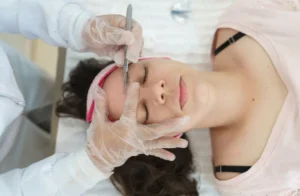Collagen is a protein that lies beneath our skin, providing elasticity, reducing wrinkles, and supporting overall skin health. Consequently, collagen supplements are becoming increasingly popular for skincare. However, as with any supplement, it’s essential to consider if collagen supplements can cause cancer. Understanding the relationship between collagen and acne will help you appreciate the benefits of collagen supplements and avoid any potential adverse reactions.
Does collagen contribute to acne?
Collagen itself does not typically cause acne. It is a protein that provides our skin with elasticity and hydration. Danny Bronshtein, a licensed and board-certified nurse practitioner at Kalon Dermatology, stated, “Collagen by itself as a supplement usually does not cause acne. However, like other supplements, if collagen products contain additional ingredients, they may contribute to acne.”
Additionally, introducing new supplements can sometimes lead to temporary hormonal changes. These changes can sometimes trigger acne. To avoid any reactions, it’s important to choose high-quality collagen products and monitor your skin’s response. If breakouts occur, consider consulting a dermatologist to determine the cause and adjust your skincare routine. Generally, collagen is beneficial for most people and unlikely to trigger acne.
Understanding the role of collagen in our body
Collagen is the most abundant protein in our body and plays several crucial roles, including:
- Collagen provides structure, elasticity, and hydration to the skin, helping to reduce wrinkles.
- It is one of the key proteins found in cartilage, helping to maintain joint flexibility and cushioning.
- Collagen contributes to bone density and strength, helping to prevent fractures.
- It supports the structure and function of muscles.
- Collagen helps to heal wounds and regenerate tissues.
- It forms a protective layer around organs and safeguards them from damage.
Exploring acne and its causes
Acne is a common skin condition that can be caused by several factors including:
- Hormonal changes, especially during puberty, menstruation, or pregnancy, can increase oil production in the skin. This change can lead to acne.
- The overproduction of oil can also clog pores, allowing bacteria to form and leading to acne.
- Dead skin cells can accumulate and block pores, contributing to acne formation.
- High-sugar or dairy diets, stress, and poor skincare routines can contribute to acne.
- A family history of acne can increase the likelihood of developing the condition.
How can collagen trigger acne?
Collagen supplements are generally safe and beneficial for most people, but in some cases, they might trigger acne breakouts. Here are the circumstances under which collagen could potentially lead to breakouts:
- Additional Ingredients: Many collagen supplements contain ingredients such as preservatives, flavorings, or sweeteners. These can clog pores, irritate the skin, and lead to acne breakouts.
- Allergic Reactions: Some people may experience allergic reactions like redness, itching, and swelling, which can later contribute to breakouts.
- Hormonal Fluctuations: Introducing a new supplement into your diet can cause temporary hormonal changes. These fluctuations can increase oil production, potentially leading to acne.
- Digestive Issues: Poor digestion can lead to systemic inflammation, which may lead to acne. Some collagen supplements can also cause digestive upset in individuals and lead to acne breakouts.
- Poor-Quality Products: Low-quality collagen supplements may contain impurities that negatively impact skin health and cause acne. It’s crucial to check the ingredients and quality before purchasing collagen supplements to avoid skin issues.
- Other Supplements or Medications: Collagen supplements may interact with other supplements or medications, leading to adverse skin reactions and acne breakouts.
- Underlying Skin Conditions: If you have pre-existing skin conditions like rosacea or eczema, collagen supplements might worsen these conditions and lead to acne.
How to boost collagen production in the skin
Though collagen supplements can benefit the skin, naturally produced collagen delivers the best results. Here are some ways to promote collagen production in the skin:
- Eat foods rich in vitamin C (such as citrus fruits), zinc (found in nuts and seeds), and copper (in shellfish) to support collagen production.
- Use sunscreen to protect your skin from UV damage, which can break down collagen fibers.
- Apply topical skincare products with retinoids, peptides, and antioxidants like vitamin E to stimulate collagen production and protect existing collagen.
- Drink plenty of water to maintain skin hydration and support collagen structure.
- Quit smoking to maintain collagen production levels and slow down skin aging.
kalon Dermatology: Your Partner in Clear and Radiant Skin
At kalon Dermatology, we’re here to help you get rid of acne and achieve clear and healthy skin. We have a team of board-certified dermatologists offering a comprehensive range of advanced acne treatments personalized to your unique skin type and concerns. Whether you’re dealing with stubborn breakouts, cystic acne, or acne scarring, we have the expertise and technology to effectively address your needs. Schedule your consultation with kalon Dermatology at 833-635-2566 and let’s work together to achieve smoother, acne-free skin.
Disclaimer: The information provided in this article is for educational and informational purposes only. It is not intended as medical advice, diagnosis, or treatment. Always seek the advice of a qualified healthcare provider regarding any medical condition or treatment.







